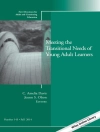This is the first New Directions volume related to young adultlearners since 1984. Then, as now, young adults are an importantsegment of the adult population but have received scant attentionin the adult education literature.
Increasingly, youths and young adults are enrolling in adulteducation programs and in doing so are changing the meaning ofadulthood. Given the significant demographic, technological, andcultural shifts during the past 30 years, there is an increasingneed for practitioners and program planners to reconsider whatconstitutes ‘adult’ and ‘adult education.’An understanding of the changing meaning of adulthood isfundamental to developing programs and policies that will addressthe needs of younger learners, and we believe it is time for anupdated discussion among adult educators and scholars in otherdisciplines.
This sourcebook is designed to reignite the discussion related tomeeting the educational needs of young adults along with a timelyand interdisciplinary discussion that highlights the transitionalneeds of young adult learners.
This is the 143rd volume of the Jossey Bass series New Directions for Adult and Continuing Education. Noted for itsdepth of coverage, it explores issues of common interest toinstructors, administrators, counselors, and policymakers in abroad range of education settings, such as colleges anduniversities, extension programs, businesses, libraries, andmuseums.
विषयसूची
EDITORS’ NOTES 1
C. Amelia Davis, Joann S. Olson
1. Conceptualizing Transitions to Adulthood 5
Johanna Wyn
This opening chapter lays the groundwork for this volume byproviding an overview of adult development theories as they relateto the transition to young adulthood along with a discussion of theblurring between youth and adult due to the ambiguity encounteredwhen trying to define adulthood.
2. Culture, Conditions, and the Transition to Adulthood17
Brendaly Drayton
An individual’s culture shapes both the definition ofadult and the experience of the transition to adulthood.Furthermore, the transition to adulthood may serve as a time whenan individual’s cultural identity is more consciously definedand more personally salient. This chapter explores the intersectionof culture and adulthood.
3. Vulnerable Youth and Transitions to Adulthood 29
Rongbing Xie, Bisakha (Pia) Sen, E. Michael Foster
This chapter discusses recent research conducted thatidentified challenges youth in the mental health system, the fostercare system, and the juvenile justice system face in theirtransition to adulthood due to limited support systems.
4. Young Adulthood, Transitions, and Dis/ability 39
Jessica Nina Lester
A discussion focusing on the social transitions to adulthoodand independent living of an often forgotten population in adulteducation, young adults labeled with (dis)abilities.
5. Becoming an Adult in a Community of Faith 51
Steven B. Frye
The vitality and ongoing existence of any community of faith–regardless of the specific religious tradition–depends onincorporating the ‘next generation’ as fullparticipants. This chapter focuses on how the transition toadulthood is transacted within various religious traditions and theextent to which that transition is a place where nonformal learningtakes place.
6. Youths Transitioning as Adult Learners 63
C. Amelia Davis
This chapter conceptualizes transitions with a focus on Adult Basic Education/GED students as they transition from high school toadult education.
7. Transitions From Formal Education to the Workplace73
Joann S. Olson
This chapter frames the transition to adulthood in the contextof the moving from formal educational settings (e.g., high school, postsecondary education) to the often less-structured learning thatoccurs in workplace settings.
8. Themes and Issues in Programming for Young Adults83
Joann S. Olson, C. Amelia Davis
In this final chapter, recurring themes from the precedingchapters are identified and discussed as they pertain to programplanning and instructional practice.
INDEX 8
लेखक के बारे में
Issue Editors:
C. Amelia Davis is an assistant professor of educational research in the Department of Curriculum, Foundations, and Reading in the College of Education at Georgia Southern University.
Joann S. Olson is an assistant professor and program coordinator in the adult and higher education program at the University of Houston-Victoria.
Series Coeditors-in-chief:
Susan Imel is director of the Eric Clearinghouse on Adult, Career, and Vocational Education, Ohio State University.
Jovita M. Ross-Gordon is an associate professor in the College of Education at Southwest Texas University, San Marcos.












